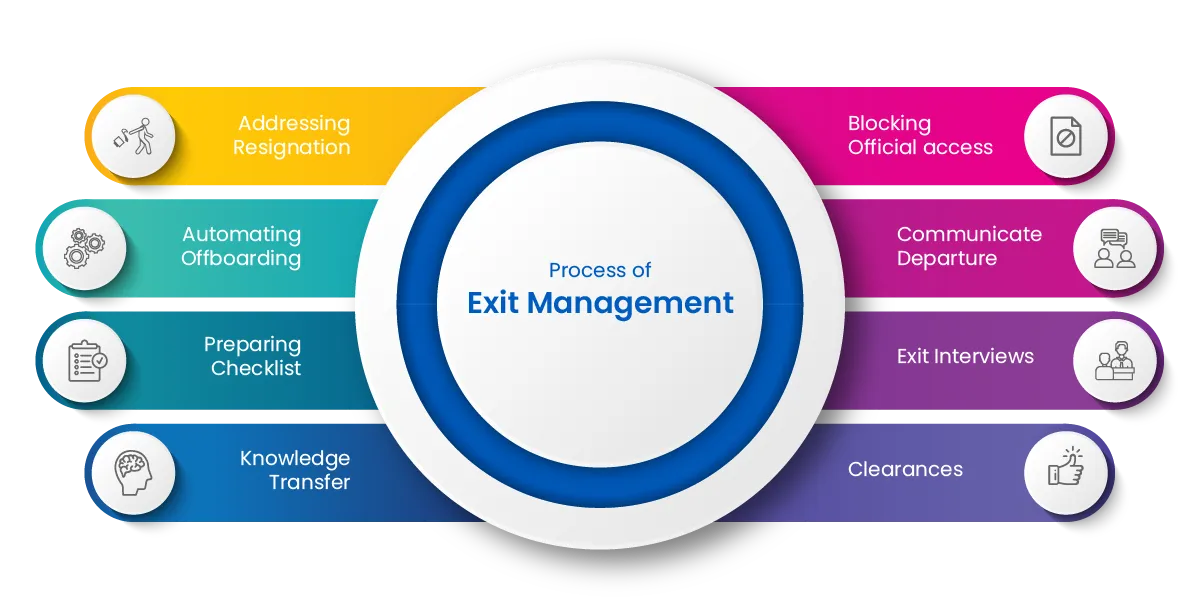What is Employee Exit Management?
Employee exit management process refers to the procedures followed on the exit of an employee due to voluntary resignation or termination from the term of employment. It is a vital process for the HR department as the organization’s belongings are to be retrieved before the exit of the employee.
The significance of offboarding management specifically lies in smoothening the process of exit of employees to retain the goodwill of the company. It lays an example for the new hires that, the company values human resources.
Exit Management helps the HR department in organizing data handed over by the leaving staff and synchronizing the same to conveniently utilize it in times of contingencies. The importance of managing to offboard is not only essential but also beneficial.
In this blog, we are sharing the benefits of exit management and its process in detail.
Benefits of Exit Management System
Exit management, or the entire offboarding process must be performed strategically. Here are some benefits of implementing a formal exit management process:
- Organize employee data management
- Retrieve official data from exit employees
- Reduce the risk of data theft
- Gather insight into the prevailing work culture
- Prompt necessary changes for the future growth of the organization.
- Contribute to strategic planning framed by the management
- Enhance employee experience
- Create a healthy impression on employee minds
- Gain constructive feedback from employee’s journey.
After we got a clear knowledge of what exit management justifies and how it benefits management, let us contemplate the procedures followed.
Process of Exit Management
The Exit management process is the synchronized steps followed by the HR management during the exit of an employee and it includes the following:

1. Addressing the Resignation
The first and foremost process of offboarding starts with addressing the letter of resignation sent when an employee resigns.
It exemplifies the management’s activeness toward cautious handling of such sensitive circumstances and empathetically reaching a befitting solution that would be beneficial for both organization and the employee.
Being decisive about the acceptance or rejection of the employee resignation letter not only provides time to come up with appropriate solutions to retain resourceful staff but also showcases the promptness of management.
It also bolsters the departing employee’s emotion that his presence mattered. It can prove to be a vital initiative in enhancing employee morale and can contribute to them being a resourceful asset till the end.
2. Automating Offboarding
The next step in the procedure is digitalizing the process of offboarding. Offboarding by nature is tedious and lengthy, involving a bulk of paper work and documentation.
So, it is necessary to automate the process to avoid complexities and laboriousness. Automation is a systematic way to manage the exit process by eliminating the manual effort in the documentation and evaluating payroll dues to be cleared during the full and final settlement of the departing employee.
Furthermore, automating the employee exit management process fastens the entire process of offboarding, thereby yielding a healthy exit of employees on a good note. Another vital factor in automating offboarding includes error-free and glitch-free assessment of data and records forwarded by the departing employees.
The saved data in cloud-based software can be accessed by the line managers and can also be transferred to the replacement (new person) of the leaving employee without any hindrance.
3. Preparing Checklist
The succeeding procedure after digitalizing the exit management process is department wise exit checklists preparation.
It implies a detailed list of all the equipment, assets, and official login access provided to the departing employee during the time of onboarding as well as the employee’s name, job role, department, etc.
A business consists of various confidential chattels and an employee is an integral part of the business makes it crucial for the business to gather all the belongings (i.e. knowledge and asset) before bidding permanent goodbye to the employee.
To take handover of data and documents, management prepares a checklist of all the assets and access existing with the employee after getting the employee resignations. The exit checklist helps management check the returnable in a synchronized way without missing anything.
It also assists other wings (i.e.- administrative, IT, and finance) to stop the access of official logins and initialize final payment thereafter.
4. Ensure Transferring Knowledge
All the documents and responsibilities acquired by the exiting employee during the tenure of his employment have to be retrieved back before his departure. Employers should ensure adequate transfer of all the exit data to the new employee who will serve as a replacement for the leaving employee.
Automation in offboarding will help store all the transferred knowledge in the software so that it could be accessed anytime, anywhere, and reduce the risk of data theft. Not all the departing employees leave the company on a good note; in such cases, there prevails a risk of non-transfer of data before departure.
To avoid such, the exit management process should be devised in an employee-centric way and the employers should maintain cordial relations with the leaving employees so they remain resourceful till they depart and after.
5. Deactivating Official Access and Recovering Equipment
After transferring responsibilities and knowledge, access from all the official logins allotted to the employee during his employment is withdrawn.
Along with that, there are several official equipment or gadgets (such as mobile phone, laptops desktops, tablets, etc.) that were provided to the employee and are necessary to be retrieved before their departure.
Possibilities persist of employees not staying in touch after their departure (may it be intentionally or occupied with other professional commitments). To avoid such kinds of encounters, management needs to stop the official access before the person exits.
It is a crucial step to be handled with caution because it can create a negative impression on the employee while widening the risk of losing data.
6. Communicate Departure to Other Departments & Completing Paper Work
The manager of the concerned department of the leaving employee is required to inform other departments such as IT, Administration, and Finances, about the exit date. The aforementioned departments are needed to be informed because IT will block access to official IDs, so the misuse of accounts can be eliminated.
The Admin will collect all the official gadgets and documents before the departure and approves the finance wing to clear dues. The signing of official documents before departure to not give something a miss and authenticate the handed-over documents is an important step in the offboarding process.
7. Conduct Exit Interview
Exit interviews are one of the vital steps in the exit management process because it gives HR insight into the professional voyage and prompts the necessary alterations to be adopted by manager for fixing the flaws if any.
The Exit Interviews process includes:
- Preparing an exit checklist on the details of facts to be known from the departing employee.
- Preparing survey forms to validate authentication of the mentioned asset (document and knowledge persisting with the employee) with actual to avoid complexities.
- Clarifying the exit reasons to know what are the loopholes to be closed and understand exit reasons.
- Conduct a session to gain constructive feedback from the employee during the employee’s journey in the company and understand the exit analytics of the company.
- Communicating retention strategies and understanding the exit reason
- Wishing the employee for career growth in the future.
The exit interview gives exit analytics on the frequent reasons for employee turnover so that changes can be made to reduce the same.
8. Full and Final Settlement & Clearances
Finally, the management should ensure the handover and approval of official belongings appropriately with proper authentication from various departments so the administrative department issues relieving letter.
After the clearance is initiated, the final payment is released which includes due date salary, employee dues, and additional cost incurred, such as provident fund clearances, etc. Automation helps in smoothening the entire exit process of offboarding processes and gives a pleasing experience to both the exiting employee and the administration.
Conclusion
The exit process is not only vital but also exhibits the how well-structured management the companies possessed. It leaves an unforgettable milestone impression on the exiting as well as existing employees about the company’s work culture.








